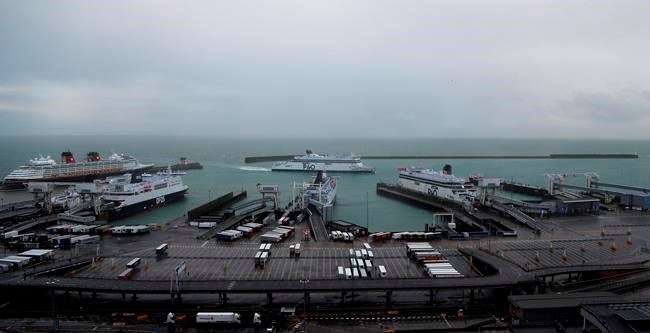DOVER, England — Gridlock at an English port kept thousands of truckers and
While some goods and passengers began arriving on French shores in the morning, many still struggled to get through. With officials warning that the backlog would take days to clear, frustrated truckers scuffled with police at the port of Dover. Some have suggested the chaos was a precursor to what Britain may face if it doesn’t come to a trade agreement with the European Union before it leaves the bloc’s economic embrace on Dec. 31.
“Looking around, it doesn’t really seem that there’s a lot of progress being made here,” said Ben Richtzenhaim, a financial services worker who drove overnight from Scotland in hopes of getting home to Germany by car. “People are still not moving out of the way, and the authorities are not doing something either. So it’s a real deadlock.”
Nations around the world began barring people from Britain over the weekend after Prime Minister Boris Johnson announced that scientists said a new version of the virus whipping around London and England's southeast may be more contagious. The announcement added to anxieties at a time when Europe has been walloped by soaring new virus infections and deaths.
On Wednesday, British Health Secretary Matt Hancock said that another new variant — from South Africa — has turned up in Britain, and announced restrictions on travel from the African country.
Some European countries relaxed their travel limits on Britain on Wednesday, though many remain in place. Still, it was France’s ban on freight that caused the most alarm and led to a feeling of intense isolation on the island nation, since the U.K. relies heavily on its cross-Channel commercial links to the continent for food at this time of year, especially fresh fruit and vegetables.
Fears of food shortages added to an already glum runup to Christmas in Britain, where authorities have scaled back or
Britain reported another 744 deaths and a record 39,237 confirmed cases Wednesday, and the health secretary said that millions more people in England would come under the country’s most severe restrictions from Dec. 26. The rules, which close all nonessential shops and ban households from mixing indoors, already cover London and surrounding areas.
Under a deal to lift France's ban, anyone arriving from Britain is required to have a virus test capable of detecting the new variant, and soldiers and contact-tracers were sent to the Dover port to administer the tests. But drivers said traffic chaos in the area was delaying that.
Rail operator Eurotunnel said some trains carrying freight and car passengers were allowed to cross to the continent beneath the English Channel on Wednesday. The director of France's Calais-Boulogne port, Jean-Marc Puissesseau, said two cargo vans had so far arrived by ferry, while some truckers simply loaded their goods directly onto ferries so a colleague could pick it up on the French side.
He said no freight trucks have made the journey yet because of testing troubles, and he didn't expect any until night time. The Calais port normally brings in up to 4,000 trucks a day.
British Communities Secretary Robert Jenrick said it would take “a few days” to test all the drivers who are currently in the county of Kent.
By late afternoon Wednesday, more than 6,000 trucks were estimated to be trying to get across the Channel, with more than half — around 3,750 — scrunched up at Kent's disused Manston Airport awaiting their cue to leave. Testing facilities were in place at the airport.
The chaos came as many Britons were already bracing for travel and commerce-related disruptions, if the U.K. and the European Union can’t agree on a post-Brexit trade deal by the time the country leaves the EU’s tariff-free single market and customs union at the end of the year.
French authorities have insisted that this week's blockade was based on scientific concerns and not politics, but some noted it may have offered a glimpse of what Britain can expect next year.
“We thought we were OK, preparing for Dec. 31 (and Brexit), and then kaboom, we are in chaos already," Puissesseau, the French port director, told The Associated Press. The slowdowns could be worse when Brexit kicks in and French authorities will have to check customs documents as well as virus tests, he warned.
Clement Beaune, France’s European affairs minister, told BFM television during a discussion about the Brexit talks that when it comes to trade, “the British side has much more dependence on Europe than the reverse.”
The Netherlands, Belgium and Bulgaria relaxed travel restrictions on Britain on Wednesday, but dozens of other countries are continuing to bar
Eurostar passenger train services also resumed from Britain to the continent, but only for citizens of Europe’s border-free zone, British citizens with EU residency and those with a special reason to come temporarily, such as truckers.
Liza Peirrusio, an Italian living in London,
“I’ve never been so happy to be a European citizen,” she said as she got off the first Eurostar to arrive since the weekend.
___
Hui reported from London and Charlton from Paris. Associated Press journalists Jeff Schaeffer in Calais, France, Nicolas Garriga in Paris, Jason Parkinson in Dover, England, Pan Pylas in London and Lorne Cook in Brussels contributed.
___
An earlier version of this story corrected the first name of the French port director to Jean-Marc, not Jean-March.
___
Follow AP’s coverage of the pandemic at https://apnews.com/hub/coronavirus-pandemic, https://apnews.com/hub/coronavirus-vaccine and https://apnews.com/UnderstandingtheOutbreak
Jo Kearney, Sylvia Hui And Angela Charlton, The Associated Press



